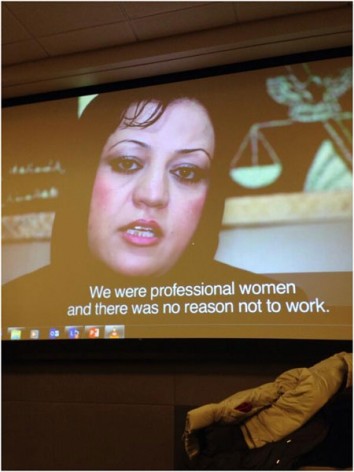
Maria Bashir, Afghanistan's only female chief prosecutor via video message. Credit: IDLO
The discussion focused both on the situation of women in Afghanistan and on a new report by the IDLO which argues that fundamental changes in justice for women will only come through increased participation and inclusiveness.
Since the fall of the Taliban, women have seized opportunities and entered the justice sector as professionals at a steady but slow pace.
“Rights have improved for all Afghans,” stated Ambassador Zahir Tanin, Permanent Representative of Afghanistan to the United Nations.
He emphasized some of the major achievements to improve women’s professional participation, including the judicial reform and the Constitution that guarantees equal rights to men and women.
“The report tells the story of women’s expectations,” Khan said, specifically In a country where 19.3 percent of lawyers are women while 85 percent of women experience some kind of abuse in their lifetime.
“Every female lawyer who challenges discrimination contributes to a better Afghanistan,” she said.
Khan warned that many Afghan women continue to fear the justice system. As a consequence, this contributes to the low number of women lawyers.
She underlined that female lawyers and judges would understand the problems better. And most of them are afraid of telling men the truth about their cases.
The report puts forward some policy recommendations, such as capacity building and technical assistance programmes, and promoting positive examples of women in the justice sector.
Panelists also highlighted obstacles to Afghan women seeking to enter the justice sector; social pressure, negative stereotypes, unequal access to legal education curricula and ongoing insecurity.
The study stresses the necessity of engaging strategies with legal education institutions, civil society and professional associations; in order to ensure the sustainability of measures targeting women’s participation in the justice sector.
No comments:
Post a Comment